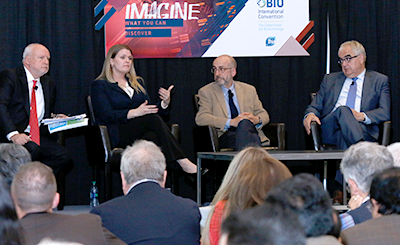Will New Approaches to Alzheimer’s Trials Lead to Better Treatments?
Abstract
While AD trials remain highly risky and expensive for drug companies, researchers in academia and industry are working together to design more efficient and precise studies that they hope will uncover new ways to stop the disease in its tracks.
From 1998 to 2011, 101 drug candidates for treating Alzheimer’s disease (AD) were tested in clinical trials. Only three drugs made it to market. There is now renewed optimism that numerous successful new drugs may be on the horizon, according to a panel representing researchers, pharmaceutical executives, and patient advocates who spoke at the 2016 BIO International Convention in San Francisco last month.

Pierre Meulien, Ph.D., Heather Snyder, Ph.D., Simon Lovestone, Ph.D., and Paul Stoffels, M.D., discuss new method approaches for research and drug development of therapies intended for Alzheimer’s Disease at the 2016 BIO International Convention in San Francisco.
The expensive failures of past AD drug candidates have paved the way for better understanding of the disease, including diagnostic biomarkers that detect abnormalities before symptoms appear, genetic risk factors, natural course of progression, and pathological pathways beyond amyloid plaque. “The stars are getting aligned for some success,” Paul Stoffels, M.D., the chief scientific officer at Johnson and Johnson, said with cautious optimism during the panel’s presentation.
While AD trials remain highly risky and expensive for drug companies, researchers in academia and industry are working together to design more efficient and precise studies that they hope will result in new drugs capable of stopping the disease on its tracks. Adaptive trial design—an approach in which multiple treatments can be simultaneously tested and results can be analyzed continuously—is one such tool.
Unlike conventional randomized, controlled trials that can take years to evaluate the efficacy of one drug in a chronic disease such as AD, adaptive trial design allows researchers to switch participants to different treatments when one treatment is not working without sacrificing the validity of placebo-controlled, unbiased experiments. Using carefully chosen biomarkers and complex algorithms, patients’ treatment and dosage can be adjusted quickly, and numerous possible treatments and doses can be tested in parallel.
Trials using adaptive trial design are more complex to conduct and require greater investment than conventional trials, but in the long run experts say these trials can be more efficient.
With 200 million euros of public and private funding, BIO panelist Simon Lovestone, Ph.D., a professor of translational neuroscience in the Department of Psychiatry at Oxford University in the United Kingdom, explained how his group plans to use adaptive design in a study of as many as 6,000 people with prodromal dementia.
The trial will compare multiple interventions with placebo, as in traditional trials. He noted that treatment groups will be evaluated using biomarkers, even if symptomatic changes are not yet detected, and can be switched to a different dose or treatment repeatedly during a trial. Thus, doses and treatments that are deemed “futile” can be weeded out quickly, and patients can access, without bias, other treatment arms, he explained.
“[Our] patients will be less likely to be exposed for a long time to a treatment that does not work,” said Lovestone. “The ability to select more promising drug candidates faster is a key advantage of adaptive trial design in slowly progressing diseases like dementia.”
Adaptive trial design has already been applied in studies conducted by the Dominantly Inherited Alzheimer Network (DIAN). The network has been testing a number of potential treatments for the past four years, and these studies are ongoing, according to Heather Snyder, Ph.D., senior associate director of medical and scientific relations at the Alzheimer’s Association. With funding from the National Institute on Aging, the DIAN trials hope to find effective drugs soon that can prevent the development of AD in patients who have a parent with a mutated gene known to cause dominantly inherited AD and thus are at much higher risk of developing AD later in life.
The Oxford study and DIAN studies—which both involved people with prodromal dementia—are just two of a growing number of trials examining treatments for preventing AD.
BIO panelist Pierre Meulien, Ph.D., explained that the focus on AD prevention trials may be due to the realization that by the time a patient has all the symptoms to meet the clinical criteria of dementia, the accumulation of amyloid plaques and tau tangles has already caused significant damage that is extremely difficult to reverse. Meulien is the executive director at the Innovative Medicines Initiative, a public-private coalition for drug development in Europe.
The inability to reverse this damage may be one reason that many seemingly promising drug candidates have failed to work in patients with AD diagnosis, the panelists noted.
While AD prevention trials are inevitably longer and more expensive than intervention trials, the panelists believe adaptive design, with the use of the right biomarkers, can increase the likelihood that these long and expensive trials with thousands of volunteers will succeed for millions of people with AD.
“If we can delay the onset [of AD] by five years, … the benefits and cost savings to society would be tremendous,” said Snyder. ■



